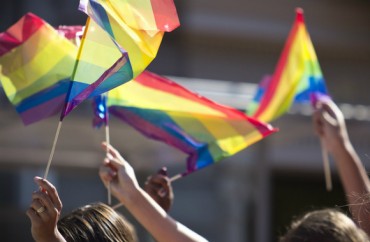
This op-ed was originally published on 4thWaveNow and has been reprinted in its entirety with permission. 4thWaveNow is a left-of-center online community concerned about rapid-onset gender dysphoria and related issues. The student who wrote this article, a self-described “feminist,” attends a small, private college in New England. She asked The College Fix to remain anonymous due to the likelihood of threats and cyberbullying for speaking out.
I have always been empathetic and sensitive to suffering. From a young age, I remember worrying about families who lost their health insurance, the exploitation of women, and the huge discrepancies of wealth in the world. So when I first heard stories about transgender teens, I was very troubled.
I got my Instagram account when I started high school six years ago. That’s when I started learning about the transgender community. I stumbled across their images without even trying. Most were young, 14 or 15, and laid a tragic narrative of being sickeningly confined to breasts and intolerant parents. Many of these internet strangers used the Instagram platform to connect with other trans youth, share their progress and unhealthy coping mechanisms, and discuss their comorbid mental health issues, such as anxiety, depression, and the fallout from sexual abuse. I did not interact with their posts, but read them out of curiosity and an attempt to understand.
That same year, I met my first real-life transgender person — the first of many. When I started high school, she went by her given name, Ingrid. She had buzzed hair, long winged eyeliner, combat boots, and lots of mini skirts. Clearly aiming to be different and cool. She was a senior, and spent most of her time painting in the art studio. Her look did not change throughout the year, but her name and pronouns did — at some point I began to hear people referring to someone named Diego. Before Diego/Ingrid graduated, s/he gave a presentation on “the transgender experience,” at which s/he defined what it feels like to have gender dysphoria, cited the suicide rate of trans people, and, most memorably, taught us trans etiquette: how to refer to trans people, use pronouns, and to never assume another person’s gender.
 Throughout the rest of high school I came across this phenomenon several more times. Many more people I knew by association came out as trans. I heard more and more about trans people in the media (including celebrities like Laverne Cox and Caitlin Jenner), and began to hear LGBT or LGBTQ thrown around a bit more in a political context. I remained empathetic towards those who came out as trans, and tried to remember the politically correct language as best I could, often at the cost of what I had learned to be grammatically correct in my AP English Language class. While I still did not really understand how being or feeling transgender could work, I did not hear anyone else questioning it and felt I could not without offending or being insensitive.
Throughout the rest of high school I came across this phenomenon several more times. Many more people I knew by association came out as trans. I heard more and more about trans people in the media (including celebrities like Laverne Cox and Caitlin Jenner), and began to hear LGBT or LGBTQ thrown around a bit more in a political context. I remained empathetic towards those who came out as trans, and tried to remember the politically correct language as best I could, often at the cost of what I had learned to be grammatically correct in my AP English Language class. While I still did not really understand how being or feeling transgender could work, I did not hear anyone else questioning it and felt I could not without offending or being insensitive.
But I was not ready for the culture shock of university, a small, selective liberal arts college. On the first day of orientation after moving into my new dorm, we had a floor meeting in which we introduced ourselves by name, location, fun fact, and preferred pronouns. “Remember, you cannot assume ANYONE’S gender identity!” I felt silly having to tell a room of 40+ people that I prefer she/her pronouns, yet many people, at least five or six, who looked obviously male or female announced that they preferred the opposite pronouns. No one flinched or stuttered or acted like this activity was superfluous–though one international student asked me later, privately, why we had to do that. One person even announced that “some days” she would prefer to be called she, but other days would be going by he. Everyone nodded along, as if, of course, this makes sense.
By one month into my freshman year, the number of trans people I knew personally or by association was growing steadily. The school is small enough that even if you don’t know someone by name, you’ve probably seen them around. There were many boys wearing eyeliner but those were boys. There were girls wearing eyeliner that were also boys. Boys with small beards that were actually girls. And everything in between. One of my roommates started dating a “cis-passing” trans boy. Someone I met at the beginning of the year whose name was Tim would now like me to relearn that name as Rebecca. Someone else who started school with hair to her waist cut it all off and became Andrew. If you can’t determine gender by someone’s appearance, why have gender at all? Why not just call each other by our biology, whether we are happy with it or not, if only for consistency and clarity’s sake? I was trying to be empathetic but it was not easy, and confusing at best. No one said anything skeptical, and neither did I.
Two months into my freshman year, the signs on the bathrooms in an academic building were changed. Rather than being marked for men/women, both bathrooms were now “multi-stall.” The only indication that one was for men was the small print “with urinals,” vs “without urinals.”
It seemed that most of the students who were suddenly transitioning were biological females who were smart but socially awkward. They revealed their identities as trans men, usually through a haircut and new wardrobe, followed by a Facebook post alerting associates to a name and pronoun change. They would soon take to social media, student forums, and classroom discussions to rant about “cis privilege,” how oppressed they are because they get stared at by strangers, how they want to assault people who misgender them, and how in love with their “queer” identities they are.
A few weeks ago, a research paper was published suggesting that the recent increase in transgender identification among young people is the result of social contagion. This seems obvious to me. Yet officials at Brown University censored this paper. I shouldn’t be surprised. This is a topic that we can’t discuss on my college campus, either.
 There is no doubt in my mind that there is a social contagion among college students. At my school, it is trendy to be transgender, and to people who feel like they don’t fit in, particularly with other people of their biological sex, choosing to transition to the opposite sex, and become a member of the opposite sex, may certainly seem like a more viable option than continuing to feel rejected while trying to fit in. But a lot of this culture surrounding trans teens and college students is aggressively narcissistic and cutesy — selfies captioned “i love being nonbinary,” “you’re gay no matter who you date,” and “baby’s first binder!” At best these random, new identities are invented to fit an aesthetic. At worst they are aggressively anti “straight white men,” apparently the worst species on earth and the ones responsible for all hardship, as they threaten professors and other students who dare to hint at an observation that doesn’t sound affirmative of transgender identities.
There is no doubt in my mind that there is a social contagion among college students. At my school, it is trendy to be transgender, and to people who feel like they don’t fit in, particularly with other people of their biological sex, choosing to transition to the opposite sex, and become a member of the opposite sex, may certainly seem like a more viable option than continuing to feel rejected while trying to fit in. But a lot of this culture surrounding trans teens and college students is aggressively narcissistic and cutesy — selfies captioned “i love being nonbinary,” “you’re gay no matter who you date,” and “baby’s first binder!” At best these random, new identities are invented to fit an aesthetic. At worst they are aggressively anti “straight white men,” apparently the worst species on earth and the ones responsible for all hardship, as they threaten professors and other students who dare to hint at an observation that doesn’t sound affirmative of transgender identities.
Within the past year, my second year at this college, I have had girlfriends who had to share a room with a biological male who decided, within the year, to change his name to Valerie. My two friends felt bad for Val, who was clearly socially awkward, had very low self confidence, and was always asking for their approval, (“do you think I look pretty?”). When they said yes of course, to validate Val, Val would reply with “I don’t think so.”
The odd part is that when we apply for housing we are able to select sex segregated or non-gender-based housing. If you select sex segregated as a female, you are paired with females, but if you select non-gender-based housing, you are paired with other people who selected non-gender-based housing, regardless of gender. These two girl friends of mine signed up for sex segregated housing, expecting to be roommates with only other females. Val signed up for non-gendered housing, yet it seems they did not have anyone to pair Val with, and thus decided it would be better to pair a biological male with two girls than two boys.
This is concerning for me, as a feminist. There is a reason why sex-segregated housing exists, and it is not for sexist reasons. Many, even most, women and college-aged girls are not comfortable sharing a room with a man they have never met. While sexual assault can happen in a number of circumstances, forcing women to room with men seems an easy way to increase the possibility. It has been important, historically, that women have spaces that are not open to men, for their own safety.
 Similarly, this past year, on the “trans day of visibility,” all of the bathroom signs throughout school were replaced with paper signs that made all of the bathrooms gender neutral. This was done by the campus LGBT club, in order to make straight people get “what it feels like to decide which bathroom to use as a trans person.” I doubt this was accurate though, because I was still caught trying to decide which bathroom would not have men in it. I opted for the bathroom I remembered had been the women’s room, as did most women. One of my directionally challenged girl friends forgot which one it was and picked the men’s. She was immediately embarrassed and confused and went to hunt for the single stall a couple floors up. If our bathrooms were more European-style bathrooms, with floor to ceiling private doors, I would probably mind very little. However, these are cheap stalls that come up to your knees, and in the men’s room of course the urinals are open to all to see. One girl shared with me that she walked into the “women’s” gender neutral bathroom to find one of our younger male professors. She was overwhelmed and went to a different bathroom. She admitted to feeling bad, as she gets the point of gender neutral bathrooms and believes that trans people should be able to use any bathroom, but she just couldn’t bring herself to pee in front of our professor. Understandably.
Similarly, this past year, on the “trans day of visibility,” all of the bathroom signs throughout school were replaced with paper signs that made all of the bathrooms gender neutral. This was done by the campus LGBT club, in order to make straight people get “what it feels like to decide which bathroom to use as a trans person.” I doubt this was accurate though, because I was still caught trying to decide which bathroom would not have men in it. I opted for the bathroom I remembered had been the women’s room, as did most women. One of my directionally challenged girl friends forgot which one it was and picked the men’s. She was immediately embarrassed and confused and went to hunt for the single stall a couple floors up. If our bathrooms were more European-style bathrooms, with floor to ceiling private doors, I would probably mind very little. However, these are cheap stalls that come up to your knees, and in the men’s room of course the urinals are open to all to see. One girl shared with me that she walked into the “women’s” gender neutral bathroom to find one of our younger male professors. She was overwhelmed and went to a different bathroom. She admitted to feeling bad, as she gets the point of gender neutral bathrooms and believes that trans people should be able to use any bathroom, but she just couldn’t bring herself to pee in front of our professor. Understandably.
What has been even more upsetting is to see is how quickly these new identities are accompanied by medical changes. I know several young women who were able to easily access testosterone soon after deciding they were trans. I know four who have had mastectomies. One is currently raising funds for her breast removal as part of a GoFundMe campaign.
While I have tried my best, and initially succeeded, in believing the narratives of the transgender experience, it struck me at college that this phenomenon is so widespread, so political, and so trendy, that I am now completely dubious. I am not allowed to speak honestly and openly on this subject without being defamed as a conservative, a transphobe, intolerant, and anti-feminist. As someone who is not trans, I am not allowed to think or talk about trans issues unless I am agreeing with a trans person. Because I can’t know what it’s like to feel born in the wrong body.
At the present time, I now know about 30 trans people personally, and another 20 by name. Given that I attend such a small school, this is a very high percentage. Even the RA of my freshman year floor, who introduced herself two years ago with she/her pronouns, now goes by he/him and identifies as a boy.
This issue became personal when my childhood friend announced she is transgender. We played with Barbies and dressed as Disney princesses when we were young. We talked about our crushes on boys, and experimented with makeup and fashion when we were teens. I can’t believe that she really thinks she is a man. She plans to medically transition. I am scared for her. But I am afraid to say anything.
I find it biologically and statistically improbable that all of these people, born at around the same time, were actually “born in the wrong body.” I find it strange that they think they need hormones and surgery that will sterilize them permanently. What seems obvious to me is that they are uncomfortable with their bodies, suffer from other issues like anxiety and depression, and see the attention and attractiveness of transition as a way out.
What I don’t understand is why all of my friends act like this is normal. Am I really the only one who has concerns? Or is everyone as scared as I am to say something?
This article was originally published in October 2018 by 4thWaveNow and has been reprinted with permission.
MORE: Universities teach gender fluidity as fact to college students
IMAGES: Shutterstock.com
Like The College Fix on Facebook / Follow us on Twitter





Please join the conversation about our stories on Facebook, Twitter, Instagram, Reddit, MeWe, Rumble, Gab, Minds and Gettr.